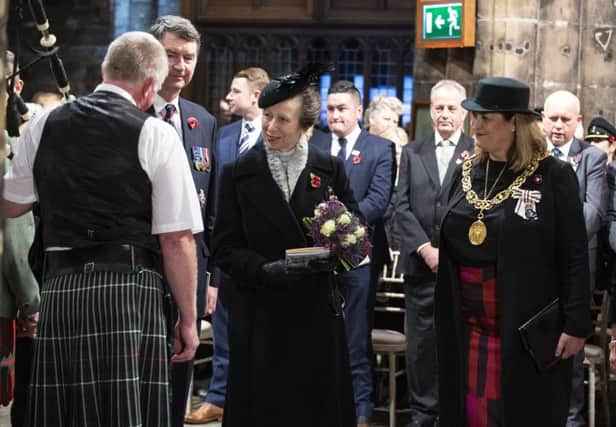Scotland's centenary Armistice service vows to keep the torch burning


There are few places in Glasgow that have borne witness to the passing of time, yet provided such comfort in its constancy, as Glasgow Cathedral.
The medieval centre of worship has been a haven since its consecration in the 12th century. Outside its Norman walls, wars have raged and rebellions have been staged, yet it has always been a place where anguish and loss are salved, and hope and courage regained.
Advertisement
Hide AdAdvertisement
Hide AdHow fitting then, as the echoes of the First World War slip from living memory, it was the venue for Scotland’s national service marking the centenary of the Armistice.
The carnage of war has long been a theme addressed from its pulpit. It was here in November 1938, as German forces looted and burned synagogues, that the Reverend A. Nevile Davidon asked people to keep faith that the world would rediscover the path of peace. Three years later, the same minister, speaking as German forces besieged Moscow, bemoaned how we had “drifted on in complacency until our civilisation and homes were in deadly danger.”
And it was here, this evening, that the Right Reverend Susan Brown, Moderator of the General Assembly of the Church of Scotland, sent a packed congregation out into a mild autumn night with simple farewell blessing. The green of the poppy represents the shoots of peace, she said, but all of us must nourish them.
Over 1,000 people attended the thoughtful and diverse service, which fused the stoicism and humour of Sir Harry Lauder with the wisdom of Mahatma Gandi. With music from Runrig and Ivor Novello, as well as the prayers of Rabidranath Tagore, the Bengali polymath, it rightly drew on international influences to recall a war which reshaped the world.
It began at 4pm, when the lights dimmed and Andy Cant, an Orcadian fiddler standing high above the congregation, his kilt shrouded by the purple and yellow hues of the stained glass East Window, played Glimmers of Goodbyes, a beautifully restrained air.
The Glasgow Cathedral Choir then sang Laurence Binyon’s For the Fallen before uniting with the National Youth Choir of Scotland for an uplifting rendition of Pack Up Your Troubles In Your Old Kit Bag and Keep The Home Fires Burning, songs which once provided respite from the terror and suffering, and optimism and joy when such qualities were scarce .
In a show of the multigenerational thread running through the service, three generations of the Gray family - its roots spanning Scotland and Germany - were among those to read the WW100 Scotland Armistice Centenary prayer.
Those listening on included Princess Royal and First Minister Nicola Sturgeon, who spoke afterwards of the importance of leaving “a legacy for future generations on the history and horrors” of the war.
Advertisement
Hide AdAdvertisement
Hide AdBut the service belonged most of all to the descendants of the fallen. They included Robin Scott-Elliot, whose great grandfather, Lieutenant Colonel William Herbert Anderson, was killed in France. Lt Col Anderson’s three brothers were also lost to the war. Fittingly, a nave of the cathedral hosts a plaque in their memory. It is, like this evening’s service, a show of public honour and private grief.
Also in attendance was Patrick Friell, whose great great grandfather, also Patrick, was in the Royal Horse Artillery. He was only 14 when the joined the Army. His great great grandson, just two years older, is keenly aware of the price he paid. Singing in the National Your Choir of Scotland as part of the service was, he said, a small way of honouring his family.
“It means a lot to me,” he reflected ahead of the service. “We’re so blessed to live the lives we have today. If it wasn’t for those who lost theirs, we wouldn’t have that.”
Elsewhere, the narrator, JJ Chalmers, an Afghanistan veteran who suffered severe injuries after being blown up by an IED in Afghanistan, spoke of the conflict’s grand, contradictory themes, and how a “harrowing, destructive” force could not just divide, but unite.
Professor Norman Drummond, chair of the Scottish Commemorations Panel and WW100 Scotland, gave an eloquent address, “While attitudes may change,” he said, “certain values in life are timeless, and there to sustain us.”
But it was one of the final passages which proved the most moving. Cara Lucas, a 10-year-old from Peebles whose Royal Marine Commando father was killed in Afghanistan, read St. Francis of Assisi’s poignant prayer.
The torch was handed over to a new generation. Has it been a century already? Another will pass soon enough. But the people here tonight will ensure no one forgets. For our tomorrow, they gave their today.